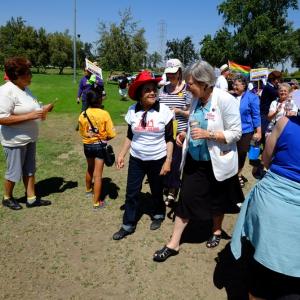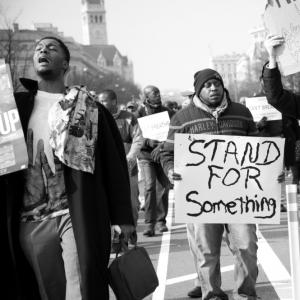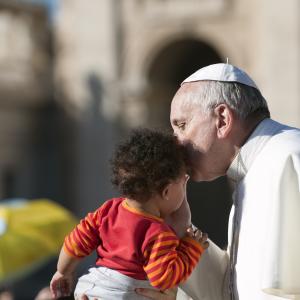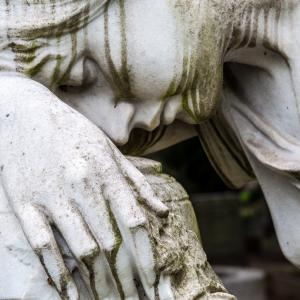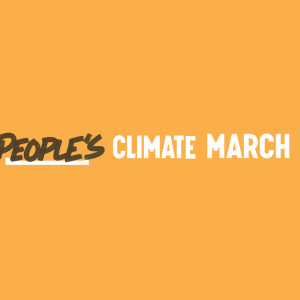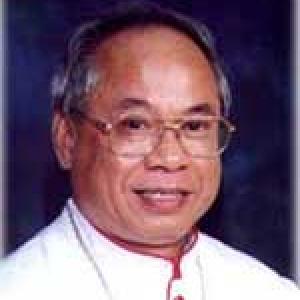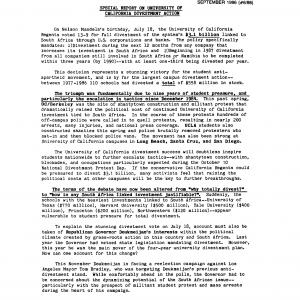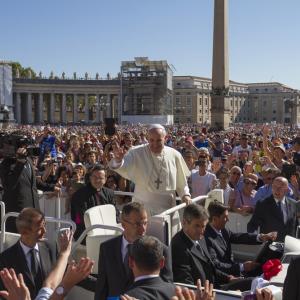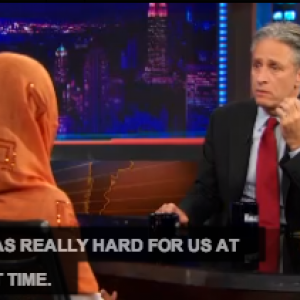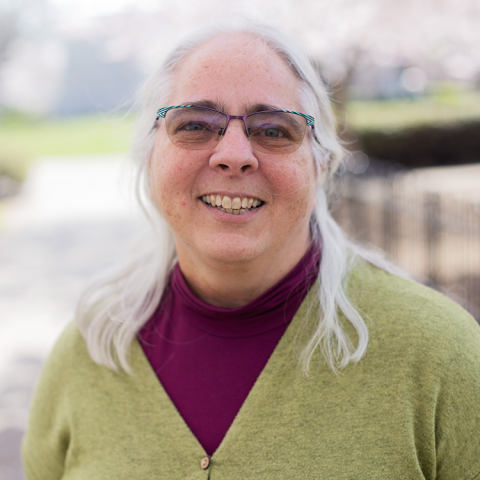
Rose Marie Berger is a Catholic peace activist and poet. She has been on Sojourners staff since 1986, and worked for social justice movements for 40 years. Rose has rooted herself with Sojourners magazine and ministry. She has written hundreds of articles for Sojourners and other publications and is a sought after preacher and public speaker. After living in Washington, D.C., for 35 years, she moved to Oak View, Calif., in 2022.
Rose’s work in Christian nonviolence has taken her to conflict zones around the world. She is active in the Catholic Nonviolence Initiative, a project of Pax Christi International, and served as co-editor for Advancing Nonviolence and Just Peace in the Church and the World, the fruit of a multiyear, global, participatory process to deepen Catholic understanding of and commitment to Gospel nonviolence. Her poetry has appeared in the books Watershed Discipleship: Reinhabiting a Bioregional Faith and Practice and Buffalo Shout, Salmon Cry: Conversations on Creation, Land Justice, and Life Together. She is author of Bending the Arch: Poems (2019), Drawn By God: A History of the Society of Catholic Medical Missionaries from 1967 to 1991 (with Janet Gottschalk, 2012), and Who Killed Donte Manning? The Story of an American Neighborhood. She has also been a religion reviewer for Publishers Weekly and a Huffington Post commentator. Her work has appeared in National Catholic Reporter, Publishers Weekly, Religion News Service, Radical Grace-Oneing, The Merton Seasonal, U.S. Catholic, and elsewhere. She serves on the board of The International Thomas Merton Society.
With Sojourners, Rose has worked as an organizer on peace and environmental issues, internship program director, liturgist, community pastor, poetry editor, and, currently, as a senior editor of Sojourners magazine, where she writes a regular column on spirituality and justice. She is responsible for the Living the Word biblical reflections on the Revised Common Lectionary, poetry, Bible studies, and interviews – and oversees the production of study guides and the online Bible study Preaching the Word.
Rose has a veteran history in social justice activism, including: leading the first international, inter-religious peace witness into Kyiv, Ukraine, following the outbreak of war in 2022, organizing inter-religious witness against the Keystone XL pipeline; educating and training groups in nonviolence; leading retreats in spirituality and justice; writing on topics as diverse as the “Spiritual Vision of Van Gogh, O'Keeffe, and Warhol,” the war in the Balkans, interviews with Black activists Vincent Harding and Yvonne Delk, the Love Canal's Lois Gibbs, and Mexican archbishop Ruiz, cultural commentary on the Catholic church and the peace movement, reviews of movies, books, and music.
Rose Berger has taught writing and poetry workshops for children and adults. She’s completed her MFA in poetry through the University of Southern Maine’s Stonecoast program. Her poetry has been published in Sojourners, The Other Side, Radix and D.C. Poets Against the War.
Rose grew up in the Central Valley of California, located in the rich flood plains of the Sacramento and American rivers. Raised in radical Catholic communities heavily influenced by Franciscans and the Catholic Worker movement, she served for nine years on the pastoral team for Sojourners Community Church; five as its co-pastor. She directed Sojourners internship program from 1990-1999. She is currently a senior editor and poetry editor for Sojourners magazine. She has traveled throughout the United States, and also in Ukraine, Israel/Palestine, Costa Rica, the Netherlands, Northern Ireland, Bosnia, Kosova, Peru, Colombia, Venezuela, and El Salvador visiting primarily with faith communities working for peace in situations of conflict.
Rose was born when atmospheric CO2 was at 319.08 ppm and now lives with her wife Heidi Thompson in Oak View, Calif., in the Ventura River watershed on traditional Chumash lands. Learn more at rosemarieberger.com.
Rose’s articles include:
- Pursuing the Secret of Joy: What is joy when it's not promiscuously tied to happiness, Hallmark, or hedonism?
- Why Our Faith Delegation went to Ukraine?: Our public message was simple: “We have come to Kyiv in solidarity to pray for a just peace.”
- Nonviolence in Najaf?: Will we recognize an Islamic peace movement when we see it?
- Of Love's Risen Body: The poetry of Denise Levertov, 1923-1997
- Glimpses of God Outside the Temple: The spiritual vision of Vincent Van Gogh, Georgia O'Keefe, and Andy Warhol.
- Damnation Will Not Be Televised: Almost everything I know about hell I learned from watching Buffy the Vampire Slayer
Speaking Topics
- Christian nonviolence, peace, war
- Catholic Nonviolence Initiative
- Climate change, creation care, watershed discipleship
- Bible study, liturgical year
- Poetry
- Spirituality and social justice
- Any topic covered in Sojourners magazine
- Catholicism
Speaking Format
- Preference for virtual events, but willing to discuss in-person events on case-by-case basis
Posts By This Author
Divest from Terrorism: The Achilles' Heel of Terror
Tackling their finances is perhaps the most effective way of restricting terrorist groups.
THE SO-CALLED WAR on terror has dangerous and shifting financial front lines. Since the 9/11 attacks, a series of “anti-terrorism financing laws” have been enacted that allow the government to designate certain charities as “terrorist” organizations or as financing terror. The government can effectively shut down organizations without ever bringing criminal charges or providing evidence against them, according to the ACLU. “As a result,” it reported, “American Muslim organizations and individuals are unfairly targeted.”
In addition to fostering Islamophobia in the larger society and fear within Islamic and other faith communities, overzealous application of these laws can actually inhibit the war on terror. It risks crippling the very Islamic charities that can effectively combat radicalization in places vulnerable to extremists. Stephen Bubb, head of a charity network in Britain, where financial terror laws are similar to those in the U.S., has emphasized “sensible, credible, proportionate regulation” of Islamic charities. “I have witnessed firsthand the difficulties faced by organizations in Pakistan fighting the same battle that we are: for security, for a better way of life, and for a better future for our children,” said Bubb.
Three Years After 'Radical Feminist' Charge, U.S. Catholic Sisters and Vatican Reach Peace Agreement
The conflicted and controversial three-year doctrinal investigation by the Vatican of U.S. Catholic sisters in the Leadership Conference of Women Religious has formally come to an end, according to a press release from the Vatican this morning and reports in the National Catholic Reporter.
“We are pleased at the completion of the Mandate which involved long and challenging exchanges of our understandings of and perspectives on critical matters of Religious Life and its practice," said Sr. Sharon Holland, IHM, president of LCWR.
She continued:
"Through these exchanges, conducted always in a spirit of prayer and mutual respect, we were brought to deeper understandings of one another’s experiences, roles, responsibilities, and hopes for the Church and the people it serves. We learned that what we hold in common is much greater than any of our differences.”
Conservative operators within the Vatican have been working for years to bring suspicion on communities of Catholic sisters in the U.S. In the past seven years, they succeeded in launching twin investigations into American nuns.
The first, launched in 2008, was a controversial and unprecedented "apostolic visitation" investigating the finances and communal practices of individual U.S.-based Catholic orders of women religious, representing tens of thousands of women. It ended in December 2014 with a formal backing down by the Vatican office from which it was launched. The final report, issued under Pope Francis, was released at a public press conference in Rome — also unprecedented — in which all those involved made clear statements about the process and emphasized a spirit of forbearance, mercy, and transparency.
The second, launched in April 2012, amounted to a hostile takeover of the Leadership Conference of Women Religious, which represents 80 percent of U.S. Catholic sisters and is the primary leadership governing body for U.S. Catholic women's orders. LCWR was accused by ultra-traditionalist Archbishop Levada of including "radical feminist themes" and fomenting "corporate dissent" from the church's teaching on human sexuality, among other things. Even though LCWR was founded in 1956 under the urging of Pope Pius XII, it was under Pope Benedict XVI that the doctrinal assessment took place.
#BlackLivesMatter Meet Stokely Carmichael
These national uprisings are part of an ongoing black liberation narrative.
IN AN undistinguished apartment around the corner from my house in Columbia Heights, the Black Power revolutionary Stokely Carmichael honed his forceful, insistent rhetoric and organizing genius. His apartment effectively served as the Washington, D.C. headquarters for the Student Nonviolent Coordinating Committee (SNCC).
Historian Peniel E. Joseph’s recently released Carmichael biography, Stokely: A Life, traces this complicated American revolutionary with nuance and freshness critical in our era of resurging black youth-led movements. Regarding Carmichael’s D.C. years, Joseph describes the intellectual crucible that was Howard University at the time.
The Caribbean-born, Harlem-raised Carmichael lived in D.C. from 1960, when he enrolled at Howard as a philosophy major, to 1965, when he relocated to Lowndes County, Ala., as a fulltime organizer for the black freedom struggle. For five critical years, Carmichael—who was raised Methodist and would later found the Black Panthers and become a leading anti-colonial, pan-Africanist living in Guinea (changing his name to Kwame Touré)—honed his organizing skills and revolutionary perspective from his student apartment on Euclid Street.
The Pope and Pandora's Box
'He is a person who has been consistent all his life.'
JOURNALIST Elisabetta Piqué was reporting for Argentina’s La Nacion from a conflict zone in Gaza when her phone rang. On the line was her friend, Padre Jorge. He knew Piqué, a war correspondent, was somewhere bombs were falling. He wanted to pray with her.
Piqué had known Argentina’s Catholic Cardinal Jorge Bergoglio since 2001. “He knew me first as a war correspondent,” Piqué told me when we met on a warm October afternoon in the courtyard of Hotel Helix in Washington, D.C. An affectionate friendship developed. Bergoglio even baptized her two children. Her new book, Pope Francis: Life and Revolution, investigates the history, passions, mistakes, humility, courage, and spiritual maturity of the man her friend has become.
In the rush to publish biographies of the new pope, some (see Paul Vallely’s Pope Francis: Untying the Knots) tout Bergoglio’s conversion from careful, benevolent, autocrat to radical, somewhat careless, lover of the poor. Piqué categorically challenges this portrayal. “He is a person who has been consistent all his life,” she says, “not somebody that suddenly became like that now. The theories that he had a conversion are totally nonsense and without any basis. He was always a sensitive person toward suffering.”
Season of Disruption
Advent is a time to answer the question, "Which side are you on?"
WHEN JOHANNES BRAHMS first played his German Requiem in Vienna in 1867, the audience was shocked. In fact, scholars report that some “hissed and booed and behaved quite boorishly.”
This October, when the St. Louis Symphony performed the same piece along with German composer Detlev Glanert’s arrangement of Brahms’ Four Preludes and Serious Songs, it elicited a similar response.
Not to the work itself, but to what occurred during intermission.
As conductor Markus Stenz took the stage, two audience members began to sing. In strong, clear voices, they performed Florence Patton Reece’s famous justice hymn: “Which side are you on, friend? Which side are you on?” Nearly a dozen more scattered throughout Powell Hall joined in. While the audience watched in stunned silence, a banner unfurled from the balcony with a silhouette of a man’s face. It said: Requiem for Mike Brown 1996-2014.
As in Vienna, there were some boos from the audience and a few expletives—more disruption following the Aug. 9 shooting death of Michael Brown, an unarmed African-American teenager, by white police officer Darren Wilson. While the Vienna audience complained that Brahms’ music was too religious for a secular setting, one St. Louis symphony-goer asked, “Is Powell Hall a proper venue for a protest?” And a Catholic priest challenged: “Instead of chanting ‘Which side are you on?’ further dividing the community, try singing ‘How can we heal?’”
Ban Ki-moon's Climate Altar Call
Reuters reported today that UN Secretary General Ban Ki-moon is starting his drum beat to gets heads of state to his emergency climate conference in New York at the end of the month.
“Ban wants heads of state at a Sept. 23 gathering in New York to outline how their countries will contribute to a mutual goal to contain rising temperatures," said Selwin Hart, the Barbadian diplomat helping to spearhead the conference. The final deal is due to be signed in Paris in 2015, according to Reuters.
This one-day, “leaders-only” Climate Summit is somewhat unprecedented. U.N. climate negotiation meetings are usually called by the executive secretary of the UN’s climate caucus (UNFCCC) and attended by directors of environmental agencies. Ki-moon is switching things up because, as we’ve learned, effective policy to reverse global warming is about economics, not science or technology.
“You don’t control economic policy at national level if you’re an environment minister,” said Michael Jacobs, a former climate change advisor to the U.K. government.
Catholic Sisters Are Redefining Leadership
True power is energy that bears fruit.
A new model of leadership that’s been refined in the fires of change and conflict is emerging from U.S. religious women.
In June, the Institute for Policy Research and Catholic Studies, along with Solidarity with Sisters, invited 150 people to Catholic University for an opportunity to discuss the model of leadership that has developed in Catholic women’s communities around the world over the last 50 years since Vatican II. The event coincided with the release of Spiritual Leadership for Challenging Times, an anthology of 10 addresses given by Leadership Conference of Women Religious (LCWR) presidents.
Catholic sisters are emerging as leaders ahead of their times. From Sister Simone Campbell, SSS, and Nuns on the Bus to Catholic Health Association CEO Sister Carol Keehan, DC, who helped pass the Affordable Care Act, to former LCWR president Sister Pat Farrell, OSF, who practiced authentic spiritual leadership in the face of the Vatican’s ongoing investigation of that organization (an investigation that Pope Francis should have laid quietly to rest, but has not), religious women are getting notice for their thoughtful, faithful leadership in the face of withering criticism and their own communities’ dramatic changes.
What are the marks of this new leadership?
Creation Yearning to be Free
Are new EPA rules and a U.N. Climate Summit enough to turn the tide on climate change?
ON JUNE 2, Environmental Protection Agency administrator Gina McCarthy announced the next phase in the Obama administration’s war on carbon pollution. The Clean Power Plan aims to reduce carbon-dioxide emissions from existing fossil-fuel power plants (the largest source of carbon pollution in the U.S.) 30 percent by 2030. That same day the stock market closed with record highs, and more than 173 companies and investors sent a letter to President Obama in support. Business understands that these regulations are good for long-term economic health.
State governments have welcomed the new plan because while the carbon limits are fixed, the path to achieving them is flexible. It allows both “rate-based” and “mass-based” methods of reduction, something unusual for the EPA, thus allowing some states to target specific industries and others to aim for overall carbon reductions. Catholic social teaching includes the principle of “subsidiarity”—let the most competent authority closest to the problem determine what works best in achieving a common-good goal. The Clean Power Plan that McCarthy, a Catholic, has rolled out does that. Yet it’s not enough and it’s not fast enough to beat our ecological endgame.
President Obama has pledged to reduce U.S. greenhouse gas emissions 17 percent below 2005 levels by 2020. To this end, he has 1) steadily increased car and truck fuel-economy standards; 2) required permits and set strict emission standards on all new fossil-fuel power plants; and 3) taken smaller, interlocking steps, such as establishing wind and solar renewable energy production on public lands, working with China to phase out hydrofluorocarbons, and significantly restricting funding from U.S. foreign aid agencies for new coal plants in other countries. This fall he may launch a low-intensity war on methane pollution from fracking and landfills. It’s not enough. There are too many loopholes.
Our Lady of the Watershed
There are thousands of ways for a church to serve its watershed and all life within it.
OUR LADY QUEEN of Peace church sits atop a low bluff overlooking the Army Navy golf course. This vibrant Arlington, Va. Catholic community has a history of staring hopelessness in the eye and declaring, “Not on our standing ground!”
Queen of Peace was founded by African Americans in the midst of virulent segregation. In the 1940s, Arlington’s black Catholics had to travel two hours by buses to attend a Mass where they were welcome. There was a closer church, but black Catholics were relegated to the back pew and prevented from receiving communion before whites. In 1945, 16 families pooled their money, hired a black real estate agent, and purchased small parcels of adjoining property under various names so as to not arouse suspicion. In an era when redlining and “neighborhood covenants” protected white enclaves and economic power, this was a courageous act. A little less than two acres—their standing ground—was purchased for $14,000. The bishop blessed Queen of Peace, Arlington’s first black Catholic congregation, on Pentecost Sunday 1947.
Now, nearly 70 years later, this multicultural community is asking a new question: With global temperatures rising and changes visible everywhere in nature, how do we face the truth of climate change?
During a speaker series in March focused on “the integrity of creation,” I encouraged them to overlap the ecclesial concept of “parish” with the ecological one of “watershed.” For life to persist, there must be living water. Scientists tell us that each watershed, no matter how small, is responsive to climate change. Since human activity has destabilized the climate, changing human activity is important in undoing the harm. And since the earth’s biosphere is made up of interlinked watershed communities, perhaps restoring our particular watershed is analogous to healing the earth at its “cellular” level, which would be a positive contribution.
The Harvest of Fidelity
"This Day: New & Collected Sabbath Poems," Counterpoint
THE STILL, ATTENTIVE, affectionate, at times lamenting, always sagacious, well-defined, occasional poems in This Day, Wendell Berry’s most recent collection, are a magnificent gift to American letters.
For nearly 35 years Berry has kept the Sabbath holy. His practice is either unorthodox or so deeply orthodox that professional religionists may not recognize it. On Sundays Berry walks his Kentucky “home place,” the roughly 125 acres of bottom land in the region his family has farmed for more than 200 years. From the seventh-day silence, solitude, and natural world, Berry has crafted his Sabbath poems.
“Occasional poems” commemorate public events, but here Berry lays quiet markers to remember personal days in the life of one man. He writes in the preface: “though I am happy to think that poetry may be reclaiming its public life, I am equally happy to insist that poetry also has a private life that is more important to it and more necessary to us.”
New Cardinals Look More Like Jesus, Less Like Rome
A Shift in Priorities?
Pope Francis wants deputies, not darlings.
IN MINDANAO, Philippines, a cheer went up: Mayron tayong cardinal! (“We have a cardinal!”) In January, Orlando B. Quevedo, archbishop of Cotabato, was one of 19 new cardinals named by Pope Francis.
Cardinal Quevedo rose from newsboy to archbishop. He’s renowned for his interreligious work and cofounding a Catholic-Muslim peace community in the southern Philippines where there is violent ethnic conflict. Quevedo is a leader in the Federation of Asian Bishops’ Conferences, a body representing more than 100 million Catholics that has courageously pushed forward the values of Vatican II amid traditionalist backlash.
During a papal conclave, when a new pope is chosen, much of the world, Catholic and otherwise, pays close attention to the news ticker from the Vatican. For the selection of new cardinals, not so much. But with Francis, everything bears watching.
Historically, cardinals were called “the princes of the church” because of the power they wielded. Functionally, they serve in the College of Cardinals, which meets with the pope to deal with questions of major importance and elects new popes. Sadly, scoring a red hat has been for some the acme of clerical ambition. The season of cardinal picking can devolve into extravagant indulgence.
But, there’s a new sheriff in town: Pope Francis wants deputies, not darlings.
The Miracle of Christmas Bread
"Food brings people together."
THURSDAY NIGHT is baking night at Panadería El Latino on 11th Street. Early Friday morning, the bakers pull their weekend supply of pan dulce from the ovens. Racks and racks of conchas, cuernos, and galletas—in eye-popping yellows and pinks—are set out to cool. The entire street is redolent with yeast, cinnamon, and sugar.
From the outside this bakery looks like any another boarded-up building. “The only indication this isn’t a crack den,” one local points out, “is the overwhelmingly delicious smell of baked goods.” El Latino distributes to corner bodegas across the metro D.C. area. But, if you brave the exterior, you can get three sweet rolls for a buck. Bread of heaven!
Extending our tables to feed the multitudes is a practice Jesus asks us to imitate (Matthew 14:16). When Jesus hosted that feast for “more than 5,000” with “only five loaves and two fish,” it was called a miracle. But the mystery wasn’t in magic math. Rather this is a tale of two parties. In Matthew 14:13-21, the dilemma was that there was too little food and too many people. But in the preceding verses, there was too much food and too little humanity.
Matthew 14:1-12 tells the story of Herod’s birthday party. Here, only the upper 1 percent, the elite and powerful, are gathered in a setting overflowing with the rarest wines, mountains of meat, and the finest breads. But Herodias’ daughter demands a different dish. The main course is served to her on a platter: It is the head of John the Baptist.
On Being a Child of the Freedom Struggles
In the fall of 1981 I was a freshman at the University of California, Davis. It didn’t take long for me to step into the “Free South Africa” divestment movement sweeping the U.C. system.
I already had some traction with political protest. My first “demonstration” that I can remember was the 1966. I was 3 years old and it was the United Farm Workers march on the California state capitol in Sacramento. I was — and still am — a child of La Causa.
The University of California system had billions of dollars invested in South Africa — as did many U.S. and international corporations and governments. The aim of the divestment movement was to “drain the swamp of the apartheid regime.” The African National Congress and the South African church movement were calling for divestment and sanctions against the South African apartheid regime — even though it would but additional burdens on ordinary people. Millions around the globe responded.
The divestment movement spread like wildfire through the U.C. system. We had regular noon rallies outside the administration offices. And more than once in my college career we blocked the steps to Sproul Hall and were subsequently arrested by campus police with the Davis city police looking on.
Talking Taboo: The Christian ‘Lean In’?
Pope Francis Asks Global Catholics What They Think
In an unsurprising move, last week Pope Francis issued a questionnaire of sorts to the world’s Catholics to find out what we think about issues related to the family. He wants to know what we think about contraception, same-sex unions, and communion for divorced and remarried couples.
The Vatican has asked the world’s bishops to distribute the survey “immediately and as widely as possible to deaneries and parishes so that input from local sources can be received,” according to a letter from Archbishop Lorenzo Baldisseri, secretary of the Synod of Bishops. A copy of Baldisseri’s letter was obtained by National Catholic Reporter.
Water Is Not A 'Privilege,' Says Catholic Bishop
Is access to clean water for public use a human right? According to Luis Infanti, the Roman Catholic bishop of Aysen in Chile, the answer is yes. This week marks the opening of Chile’s “First Cabildo for Water,” a meeting organized by the Coalition for the Defense of Water and Life, comprising civil society and religious groups.
People from all over Chile are attending and bringing water samples taken from lakes, streams, and rivers in their communities to be blessed by Bishop Infanti. “Water has often been captured, kidnapped and commodified,” said Infanti, according to Agenzia Fides, “but we know that it must give life and reach all our brothers and sisters, flow in abundance and not be anyone’s privilege.”
Jon Stewart to Malala Yousafzai: 'Can I Adopt You?'
Just as she left the world speechless when she addressed the United Nations in July, Malala Yousafzai, the 16-year-old Pakistani advocate for women’s rights and access to education, rendered America's jester Jon Stewart tongue tied when he hosted her this week on The Daily Show with Jon Stewart. Her new book I Am Malala is just released.
"Education is the power of women. That's why the terrorists are afraid of education. They do not want women to get education because then women would become more powerful," said Malala, who is nominated for the Nobel Peace Prize to be announced this week.
The Taliban first targeted Malala on "Googlenet" in 2012, she said. But she decided that it was better to not respond to the threats with violence, even in self-defense.
"If you hit a Talib with your shoe, then you will be no better than the Talib," she told a star-struck Stewart.
"Can I adopt you?" Stewart asked.
The Daily Show
Get More: Daily Show Full Episodes,The Daily Show on Facebook
Unlawful Entry
I watched the police toss Steve, age 70, into the crowd behind me.
OFFICER MARIO normally worked for Homeland Security. On this Friday night he’d been seconded to the Washington, D.C. Metro police, who had their hands full. Not only did they have the usual “drunk and disorderlies,” but now 54 people who looked like card-carrying members of the AARP were filling up their holding cells. Officer Mario, of retirement age himself, was feeling fortunate. He’d been assigned to the women’s side.
“Ladies, ladies, ladies!” Mario said, sauntering in with a mischievous smile. “This must be my lucky night.”
The evening before, we’d all been at St. Stephen and the Incarnation Episcopal Church running role plays on how to “flash mob” the corporate headquarters of Environmental Resources Management (ERM), the firm hired by the U.S. State Department to provide an environmental impact statement on the Keystone XL pipeline. To the disbelief and concern of climate scientists, ERM claimed that TransCanada’s Keystone pipeline would not significantly contribute to climate change. ERM was suspected of “misleading disclosures” regarding conflict of interest and material gain from the pipeline’s completion.
Our white-haired mob of mostly grandparents converged on ERM headquarters at noon to shine a light on such shady dealings. While six silver foxes blocked the elevators by chaining their arms together inside a PVC pipe, I watched two D.C. police lift Steve, age 70, and toss him into the crowd behind me. I knew this nonviolent civil disobedience wasn’t going as planned.
